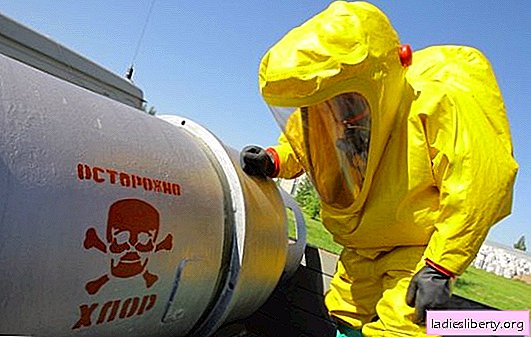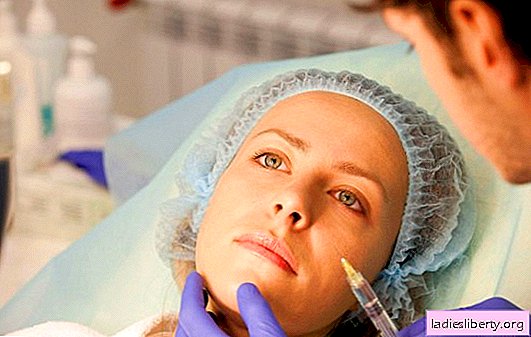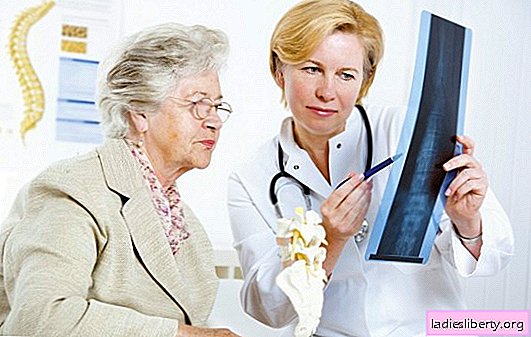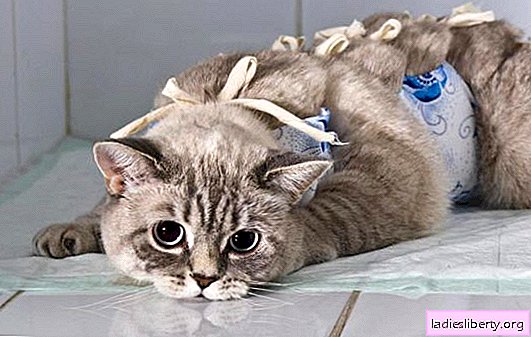
Chlorine is a chemical substance with a pungent odor and a yellow tint. It can be used for quite different purposes and, unfortunately, poisoning it, is far from rare. Consider in more detail all the symptoms of chlorine poisoning, first aid measures and prevention.
Chlorine poisoning: the first signs and causes
The following situations are distinguished in which accidental chlorine poisoning can occur:
1. Using an excessive dose of chlorine to disinfect water in pipes.
2. Washing, as well as bleaching measures for clothes in the room without fresh air (with doors and windows tightly closed).
3. Bathing in a pool containing a large amount of chlorine.
Chlorine itself can enter the body in various ways - through the skin, along with food (water), as well as through the mucous membranes (when inhaling poisonous vapor).
The following first signs of chlorine poisoning are distinguished:
1. Cough and sore throat.
2. Shortness of breath.
3. The spasm is respiratory.
4. A feeling of discomfort during breathing.
5. Burning in the eyes and severe lacrimation.
6. A feeling of intense bitterness in the mouth.
7. The appearance of headaches.
All symptoms of chlorine poisoning
Symptoms and manifestations of chlorine poisoning largely depend on the form, complexity and type of the damage to the body.
There are four main forms of this poisoning:
1. Lightweight.
2. Average.
3. Severe.
4. Instant.
With a mild form of poisoning, the patient will generally feel satisfactory. Only the upper respiratory membranes will be affected. Symptoms will not be very pronounced (slight tearing and slight sore throat). Usually, with such poisoning, a person can cope without medical assistance.
The average form of poisoning is accompanied by more vivid symptoms. During it, the patient may experience a respiratory spasm, which will lead to suffocation. If you do not help a person in a timely manner, then in a few hours he will have pulmonary edema.
The severe stage of poisoning is usually accompanied by loss of consciousness and shallow breathing. The patient's death can occur within half an hour. The cause of this will be a burn of the lungs.
The last (fulminant) stage of poisoning occurs with a high concentration of chlorine, due to which a person may experience cramps, respiratory arrest, facial redness, etc.
Consider the manifestations of each type of poisoning in more detail.
A mild form of poisoning is accompanied by the following characteristic symptoms:
1. General malaise and weakness.
2. Redness of the eyes.
3. Burning in the throat and nose.
4. A little cough.
This condition can be observed in humans for several days after poisoning.
During a moderate degree of poisoning, the patient may develop the following symptoms:
1. A headache that is more like cramping.
2. Tearing.
3. An attack of suffocation and severe coughing.
4. Chest pain.
5. Excessive mental agitation due to the effect of chlorine on the nervous system.
6. Hyperemia and itching of the skin occurs when chlorine enters through it.
During a severe form, cramps, impaired consciousness (loss of consciousness), as well as respiratory arrest, may join the patient's symptoms described above. If timely assistance is not provided to the victim in this condition, then there is a very high risk of death in a few minutes.
As for the fulminant form of poisoning, it is accompanied by the most striking and terrifying signs. Her symptoms will be:
1. Swelling of the veins on the face and the acquisition of a red tint.
2. Fainting.
3. Cramps.
4. Stop breathing.
5. Involuntary urination.
6. A sharp respiratory spasm.
Death in this state is due to suffocation. As a rule, the lethal outcome is instant.
In addition, there is also a chronic form of poisoning with this chemical. Usually it occurs in those people whose professional activities are associated with the disinfection of chlorine something.
In this condition, a person may suffer from constant weakness, malaise, dry cough that does not go away. He may also have a predisposition to depression and cramps.
First aid for chlorine poisoning
If you suspect a chlorine poisoning, you should immediately call a doctor. Prior to his arrival, first aid should be provided to the victim. It provides such:
1. Remove the patient from the room in which the poisoning occurred. At the same time, the person providing the aid should already be wearing a protective gauze bandage or respirator, otherwise he himself might be poisoned.
2. Provide the patient clean air.
3. Remove contaminated clothing from a person and rinse affected skin with warm water.
4. If poisoning occurred due to accidental ingestion of chlorine, the patient needs to rinse his stomach.
5. In case of damage to the eyes, they must be washed with water and a solution of soda.
6. In the event that the mucous membranes of the throat and nose were affected, the patient should be inhaled with the addition of soda. This will relieve cough and will help relieve respiratory cramp.
First aid for chlorine poisoning is extremely important, because with it you can slow down the process of damage to the body with this substance and at least slightly stabilize the patient's condition. Moreover, often these measures save a person’s life when he does not have time to wait for the arrival of doctors.
Chlorine Poisoning: Treatment
Almost always after chlorine poisoning, a person needs urgent hospitalization and resuscitation.
Treatment is selected individually for each patient, depending on the complexity of his condition and symptoms.
Traditional therapy for chlorine poisoning has the following tasks:
1. Saturation of the patient with oxygen and relieve respiratory spasm.
2. Improving alkaline metabolism in the body.
3. Conducting antibiotic therapy.
4. Elimination of pulmonary edema and stabilization of the general condition of a person.
The first thing to do when treating chlorine poisoning is to ensure that your airways are passable. Thus, a tracheotomy can be performed on the patient and temporary mechanical ventilation is connected.
You also need to enter prednisone or hydrocortisone.
When burning eyes, instill them with Novocaine solution. To prevent the development of infection in the eyes, a blindfold with syntomycin ointment should be applied to them.
In addition, if the patient developed complications after chlorine poisoning, then further therapy will be aimed at stopping them. It provides such:
1. With toxic pulmonary edema and a severe burn of the upper respiratory tract, the patient is shown antibiotic therapy and the use of special inhalers.
2. With a sharp decrease in blood pressure, a person may be prescribed hormonal drugs and heart medications. If heart rhythm is disturbed, Atropine is used.
3. For severe pain (including headaches), analgesics are used.
As medical practice shows, with timely treatment to the doctor from chlorine poisoning, even patients with a serious condition can be cured. At the same time, timely first aid plays a very important role.
Chlorine Poisoning Prevention
Prevention of chlorine poisoning is to comply with the following doctor's recommendations:
1. When choosing a chemical disinfectant for cleaning the house, the hostess should always read the composition of such substances. It is better not to use products containing chlorine at all, but if you still use them, then during and after the procedure you need to ventilate the room. Also, the person should be wearing protective gloves and a mask. After that, he should take a shower and wash his clothes.
2. In order not to poison with chlorine in enterprises, all safety measures for working with this substance should be observed (wear safety glasses, gloves and a mask).
3. At the first signs of chlorine poisoning, you need to know how to help yourself and your neighbor. Also in this condition should not be delayed with a trip to the doctor.
4. Due to the fact that chlorine penetrates very quickly through the skin into the body, you should be extremely careful when visiting the pools.
5. It is better not to drink tap water that is chlorinated. Instead, you need to boil water, drink from a filter or buy a ready-made liquid.











